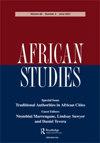Fire and media: Towards a new South African journalism
IF 0.9
4区 社会学
Q2 AREA STUDIES
引用次数: 1
Abstract
INTRODUCTION The Ruth First Fellowship brings together academic research and social activism in the tradition of the pioneering journalist-activist the Fellowship honours. The Fellowship seeks research and critical thinking that will inform activism, and activists who will bring their experience to enrich the world of research. It also favours younger, emerging voices that will benefit from the exposure. Work is presented as part of the annual Ruth First Memorial Lecture at the University of the Witwatersrand. Welcoming critical investigations of social dynamics in Africa, grounded in relevant, illustrative, qualitative, evidentiary approaches, African Studies provides support and partnership for the Fellowship, which is hosted by the journalism department of the University of the Witwatersrand. The journal encourages innovative contributions from established and new scholars that reflect current conceptual thinking and draws upon Africa in order to question received theoretical and methodological paradigms. When the Ruth First committee decided to focus on the media in 2018, journalist Niren Tolsi’s proposal promised a fresh approach to tackling the challenges the South African media is facing. In the wake of recent incidents involving fire in very different communities, in the Knysna area and in informal settlements, he undertook to look into how our news media covered these events and what the contrasting treatments and responses told us about the state of our journalism and news media. He placed this in the context of changes taking place in our media, notably the growth of social media, and asked what it told us about the impact this new technology was having on our public sphere. The ‘outrage machine’ of social media responded very differently to fire in informal settlements and more privileged areas such as the scenes of the Knysna fires, he showed, reinforcing antagonistic ethnic and class consciousness. Far from the original promise of new media technologies to expose us to a multiplicity of voices, it ensures we hear only what we want to hear, reinforcing social siloes rather than breaking them down. Tolsi writes: ‘The Ruth First Fellowship allowed me to think through some of the major challenges facing South African media. These include the effects of social media disinformation on SA's political stability, concentrated toxic media ownership in SA, the neuroscientific effects of social media's unethical design on the traditional bonds that mobilised communities against the worst excesses of state and corporate power. It triggered a personal quest to find SA-specific responses to this global media crisis so as to contribute towards defining a new journalism in this digital moment. Perhaps the most uplifting aspect of the fellowship has been the numerous responses I received from journalists – especially young journalists.’火与媒体:走向新的南非新闻业
鲁斯第一奖学金汇集了学术研究和社会活动的先驱记者-活动家奖学金荣誉的传统。该奖学金寻求将为行动主义提供信息的研究和批判性思维,以及将其经验丰富研究世界的活动人士。它还支持年轻的、新兴的声音,这些声音将从曝光中受益。作品作为一年一度的露丝第一纪念讲座的一部分在威特沃特斯兰德大学展出。非洲研究欢迎对非洲社会动态的批判性调查,以相关的、说明性的、定性的、证据性的方法为基础,为由威特沃特斯兰德大学新闻系主办的奖学金提供支持和合作。该杂志鼓励既有学者和新学者的创新贡献,这些贡献反映了当前的概念思维,并借鉴了非洲,以质疑公认的理论和方法范式。当“露丝第一”委员会在2018年决定将重点放在媒体上时,记者尼伦·托尔西(Niren Tolsi)的提议承诺采取一种新的方法来应对南非媒体面临的挑战。最近在不同的社区,在克尼斯纳地区和非正式住区发生了涉及火灾的事件,他承诺调查我们的新闻媒体如何报道这些事件,以及对比的处理和反应告诉我们我们的新闻和新闻媒体的状况。他把这个问题放在我们的媒体正在发生的变化的背景下,尤其是社交媒体的发展,并问我们,关于这项新技术对我们的公共领域的影响,它告诉了我们什么。他指出,社交媒体的“愤怒机器”对发生在非正式定居点和更特权地区的火灾的反应截然不同,比如克尼斯纳大火的场景,这强化了敌对的种族和阶级意识。新媒体技术原本承诺让我们接触到各种各样的声音,但它确保我们只听到我们想听到的,这加强了社会的藩篱,而不是打破它们。托尔西写道:“露丝第一奖学金让我思考南非媒体面临的一些主要挑战。其中包括社交媒体虚假信息对南非政治稳定的影响,南非集中的有毒媒体所有权,社交媒体不道德设计对传统纽带的神经科学影响,这些纽带动员社区反对国家和企业权力的最严重过度行为。它引发了我个人的探索,寻找sa对这场全球媒体危机的具体回应,以便在这个数字时代为定义一种新的新闻业做出贡献。也许这项奖学金最令人振奋的方面是我从记者,尤其是年轻记者那里收到的大量回复。”
本文章由计算机程序翻译,如有差异,请以英文原文为准。
求助全文
约1分钟内获得全文
求助全文

 求助内容:
求助内容: 应助结果提醒方式:
应助结果提醒方式:


